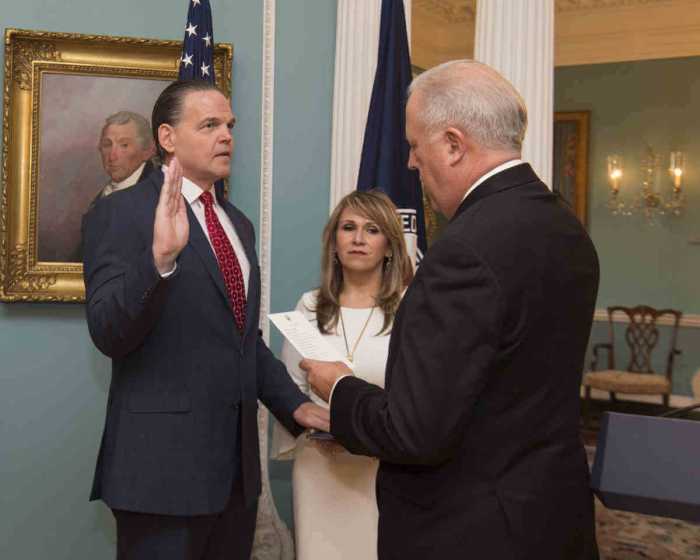US District Judge R. Brooke Jackson has ordered the State Department to issue a gender-neutral passport to Dana Alix Zzyym, who was identified as female at birth but rejects the gender binary, identifying neither as male nor female. Lambda Legal represents Zzyym in this long-running lawsuit in the federal trial court in Denver.
Judge Jackson refers to Zzyym as “an intersex individual” who submitted a passport application in September 2014. In common with many intersex people, Zzyym uses the pronouns they, them, and their, but Jackson skirts the pronoun issue by using Zzyym’s gender-neutral first name throughout the opinion in place of pronouns.
“Instead of checking the box labeled ‘M’ for male or ‘F’ for female on the application form, Dana instead wrote ‘intersex’ below the ‘sex’ category,” wrote Jackson, who noted that Zzyym sent passport authorities a letter explaining they were neither male nor female and wished to instead mark “X” in line with International Civil Aviation Organization (ICAO) standards for machine-readable travel documents.
The State Department, however, denied the application, explaining it would instead issue a passport listing their gender as “female” because that was the sex listed on the driver’s license Zzyym submitted to prove their identity. Or Zzyym could receive a passport designating their gender as “male” by submitting a letter from “your attending medical physician” verifying a gender change.
In appealing the denial, Zzyym submitted two sworn statements by physicians at the Veterans Affairs Medical Center in Cheyenne, Wyoming, verifying their gender as intersex.
After several State Department refusals to reconsider, Zzyym, in 2015, sued the State Department, arguing that its conduct was “arbitrary and capricious” in violation of the federal Administrative Procedure Act, which requires that agency action be undertaken for a reason. The lawsuit also asserted that by imposing the male-female gender choice the State Department exceeded the authority Congress delegated to it for the issuance of passports and violated Zzyym’s Fifth Amendment due process and equal protection rights. They asked the court to compel the State Department to issue a passport “accurately reflecting the plaintiff as intersex.”
On November 16, 2016, Judge Jackson ruled “the agency’s decision-making process was not rational based upon the evidence in the record,” but rather than compel it to issue Zzyym the passport they sought, he instead sent the case back to the State Department for “reevaluation of its gender policy.”
In March 2017, two months into the new Trump administration, Zzyym sought either a permanent or temporary passport bearing an X or another third-gender marking so they could attend an international conference. The State Department denied that request, and two months later sent an explanation that boiled down to “that’s the way it is.”
At that point, Zzyym moved to reopen the case, and on September 17 Jackson ruled, finding there is no reason to address their constitutional claim, since the matter can be resolved to the plaintiff’s satisfaction under the Administrative Procedure Act (APA).
Jackson noted that US passports did not record gender prior to 1976, and that in his 2016 order, “I found that the administrative record did not show that the Department’s decision-making process that resulted in the gender policy was rational.” Instead, it “seemed to be ad hoc rationalizations for the binary nature of the gender field.”
The memorandum that the State Department provided to Zzyym in May 2017 fared no better. Though the agency acknowledged that other countries have accommodated non-binary individuals by using an “X” on travel documents readable by standard passport equipment in use at border crossings and airports, it advanced five “reasons” for its “gender policy” — each of which pointed to inconveniences imposed on the State Department in verifying identity and coordinating with other government agencies.
“Looking at the proffered reasons and cited evidence provided by the Department,” wrote Jackson, “I find that the Department’s decision is arbitrary and capricious,” and he went through the reasons step by step, explaining why they failed to show “rational decision making,” the minimal requirement under the APA to justify an administrative decision. Since Zzyym is neither male nor female, the agency cannot argue that its policy is justified by the need for “accurate” identification of people.
Finding that the most recent memorandum from the State Department explaining its position “added very little” to what it unsuccessfully presented to the court in 2016, Jackson also held that the agency’s statutory authority to issue passports “does not include the authority to deny an applicant on grounds pertinent to basic identity, unrelated to any good cause…”
Jackson enjoined the State Department from “relying upon its binary-only gender marker policy to withhold the requested passport” from Zzym.
Lambda Legal attorneys Camilla Bronwen Taylor, M. Dru Levasseur, and Paul David Castillo were assisted in representing Zzyym by several pro bono attorneys and local Denver counsel.





































